
Fable is a literary genre defined as a succinct fictional story, in prose or verse, that features animals, legendary creatures, plants, inanimate objects, or forces of nature that are anthropomorphized, and that illustrates or leads to a particular moral lesson, which may at the end be added explicitly as a concise maxim or saying.

The House of Tolstoy, or Tolstoi, is a family of Russian gentry that acceded to the high aristocracy of the Russian Empire. The name Tolstoy is itself derived from the Russian adjective "толстый". They are the descendants of Andrey Kharitonovich Tolstoy, who moved from Chernigov to Moscow and served under Vasily II of Moscow in the 15th century. The "wild Tolstoys", as they were known in the high society of Imperial Russia, have left a lasting legacy in Russian politics, military history, literature, and fine arts.

Ivan Sergeyevich Turgenev was a Russian novelist, short story writer, poet, playwright, translator and popularizer of Russian literature in the West.

The Kreutzer Sonata is a novella by Leo Tolstoy, named after Beethoven's Kreutzer Sonata. The novella was published in 1889, and was promptly censored by the Russian authorities. The work is an argument for the ideal of sexual abstinence and an in-depth first-person description of jealous rage. The main character, Pozdnyshev, relates the events leading up to his killing of his wife: in his analysis, the root causes for the deed were the "animal excesses" and "swinish connection" governing the relation between the sexes.
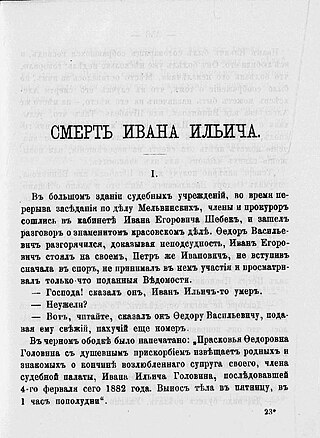
The Death of Ivan Ilyich, first published in 1886, is a novella by Leo Tolstoy, considered one of the masterpieces of his late fiction, written shortly after his religious conversion of the late 1870s.

Milovan Glišić was a Serbian writer, dramatist, translator, and literary theorist. He is sometimes referred to as the Serbian Gogol.

Yasnaya Polyana is a writer's house museum, the former home of the writer Leo Tolstoy. It is 12 kilometres (7.5 mi) southwest of Tula, Russia, and 200 kilometres (120 mi) from Moscow.
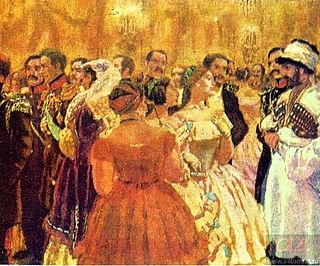
Hadji Murat, also written Hadji Murad is a novella written by Leo Tolstoy from 1896 to 1904 and published posthumously in 1912. Its titular protagonist Hadji Murat is an Avar rebel commander who, for reasons of personal revenge, forges an uneasy alliance with the Russians he has been fighting.
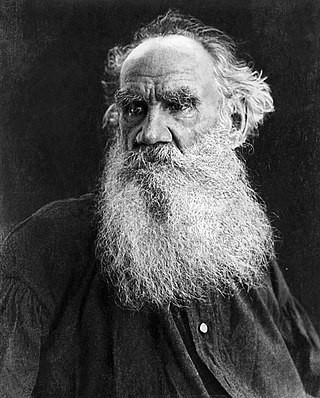
This is a list of works by Russian writer Leo Tolstoy (1828–1910), including his novels, novellas, short stories, fables and parables, plays, and nonfiction.
"Wisdom of Children" is a short story by Russian author Leo Tolstoy first published in 1885. It takes the form of a parable about forgiveness.
"Quench the Spark" is a short story by Russian author Leo Tolstoy first published in 1885. The story takes the form of a parable concerning the virtues of reconciliation.
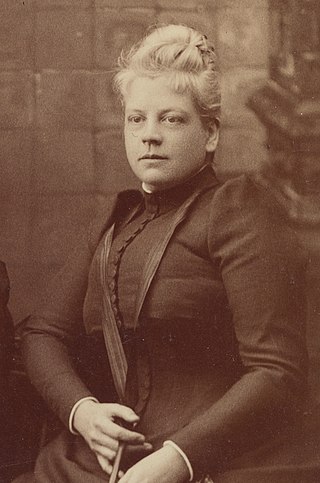
Isabel Florence Hapgood was an American ecumenist, writer, and translator, especially of Russian and French texts.
Leoš Janáček wrote two string quartets.
The Kreutzer Sonata is a lost 1915 American silent romantic drama film directed by Herbert Brenon and costarring Nance O'Neil, Theda Bara, and William E. Shay. The film was based on the 1902 play of the same name by Jacob Gordin, which was based on Leo Tolstoy's 1889 novella. Produced by Fox Film Corporation, it was shot at the company's studio in Fort Lee, New Jersey.
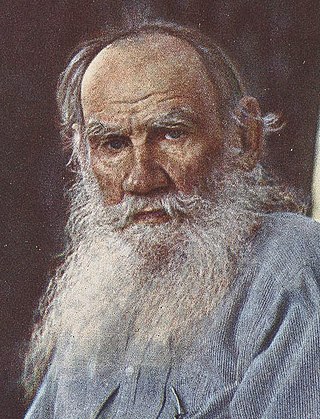
Count Lev Nikolayevich Tolstoy, usually referred to in English as Leo Tolstoy, was a Russian writer. He is regarded as one of the greatest and most influential authors of all time. He received nominations for the Nobel Prize in Literature every year from 1902 to 1906 and for the Nobel Peace Prize in 1901, 1902, and 1909.

Countess Sophia Andreyevna Tolstaya, sometimes anglicised as Sofia Tolstoy, Sophia Tolstoy and Sonya Tolstoy, was a Russian diarist, and the wife of writer Count Leo Tolstoy.
"The Devil" is a novella by Leo Tolstoy. It was written in 1889, given an alternative ending in 1909, but published only posthumously in 1911. Like Tolstoy's The Kreutzer Sonata, written around the same time, "The Devil" deals with the consequences of sexual emotion.
Rosemary Lilian Edmonds, née Dickie, was a British translator of Russian literature whose versions of the novels of Leo Tolstoy have been in print for 50 years.

"After the Ball" is a short story by the Russian writer Leo Tolstoy, written in the year 1903 and published posthumously in 1911. The short story serves as an example of Tolstoy's commentary on high culture and social governance, as explored through one man's experience with love.

"Church and State" is an article by Leo Tolstoy written in 1886. It was translated to English and then published by the anarchist Benjamin Tucker. In this text, Tolstoy condemns anyone who collaborates with the state in committing a war, and especially condemns the Eastern Orthodox Church for supporting the Tsar's wars when Christianity teaches "Thou Shalt Not Kill."













